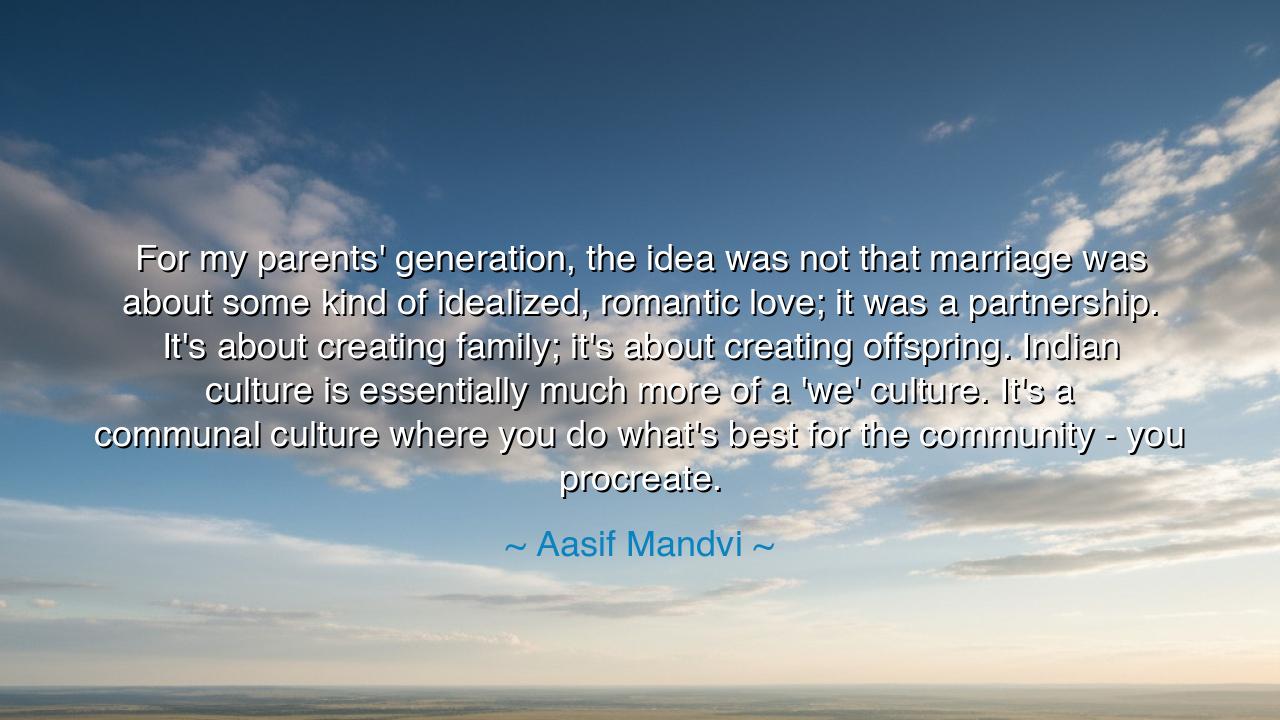
For my parents' generation, the idea was not that marriage was
For my parents' generation, the idea was not that marriage was about some kind of idealized, romantic love; it was a partnership. It's about creating family; it's about creating offspring. Indian culture is essentially much more of a 'we' culture. It's a communal culture where you do what's best for the community - you procreate.






O Seekers of Wisdom, listen closely to the words of Aasif Mandvi, who speaks of the enduring values passed down through generations: "For my parents' generation, the idea was not that marriage was about some kind of idealized, romantic love; it was a partnership. It's about creating family; it's about creating offspring. Indian culture is essentially much more of a 'we' culture. It's a communal culture where you do what's best for the community - you procreate." These words carry with them the weight of ancient wisdom, a reflection on the meaning of marriage, family, and the communal bonds that tie us all together.
In the days of old, the great civilizations understood that marriage was not merely an individual pursuit for love, but a union meant to strengthen the fabric of society itself. In Rome, marriage was seen as the foundation upon which the stability of the family and the state rested. The ancient Romans had a strong sense of duty to their families and to the community. Marriage was a partnership, a joining of two people to create offspring who would contribute to the strength and survival of their people. This view was not driven by romantic love, but by the understanding that family and community were the cornerstones of civilization itself.
Indian culture, as Mandvi so poignantly notes, carries with it this same ancient perspective—a focus on the communal, the collective, and the generational. In the ancient traditions of India, marriage was not just the coming together of two individuals for their own personal happiness, but a sacred union meant to serve the larger purpose of the family and society. In the Vedic traditions, dharma (the moral order) emphasized the duty of individuals to their families and communities. The ancient texts are filled with stories of marriage as a means of maintaining balance, prosperity, and the continuity of life itself. Love was important, but it was not seen as the driving force. Instead, duty—the fulfillment of one's responsibilities to family and community—was paramount.
Consider the example of the Ramayana, one of the great epics of India. In the story, Rama and Sita’s marriage is not solely about romantic affection, but about the larger purpose of upholding dharma, the moral order of the universe. Their union is one of partnership and duty, both to each other and to their people. Their relationship is a reflection of the communal values that underlie the society around them, where the individual is always considered in the context of the whole. In the same way, Mandvi reflects on how marriage in his parents’ generation was about family, community, and the greater good, not the idealized pursuit of personal happiness or love.
In the modern world, we are often told that marriage is about finding our soulmate, a perfect match that fulfills all of our emotional and romantic needs. This view, though beautiful in its own right, is a relatively modern conception, one shaped by individualism and the quest for personal fulfillment. Yet, as Mandvi reminds us, many cultures, including Indian culture, view marriage as a partnership—a bond that transcends the individual and serves the larger purpose of creating family and procreating, for the continuation of society. The focus is not solely on the desires of two people, but on the needs of the community and the future generations that will carry on the work of those who came before.
The lesson, O Seekers, is not to diminish the value of romantic love or the individual in marriage, but to recognize that marriage, like many sacred traditions, is rooted in a larger purpose. It is a union that supports the family, builds the community, and ensures the continuity of life. Love is certainly part of it, but so too are the duties that we carry to those who came before us and to those who will come after. In our own lives, we must remember that our relationships and families are not only about us, but about the generations that will follow and the communities that we help shape. Just as Mandvi’s parents saw marriage as a bond of partnership and duty, so too must we learn to embrace the deeper, communal aspects of love and family.
Let us, then, live with a sense of duty and responsibility, not just to our own desires, but to the greater good of those around us. Honor the community, the family, and the generations that sustain us, and recognize that the choices we make today will echo in the lives of those who come after us. Whether in marriage, parenthood, or societal involvement, we must always be mindful that we are part of a larger whole. In doing so, we honor not only the individual, but the greater good—the legacy that binds us all.






AAdministratorAdministrator
Welcome, honored guests. Please leave a comment, we will respond soon